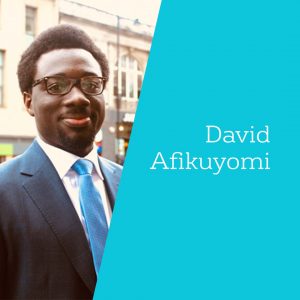 BSc Economics alumni, David, shares how his degree has enabled him to succeed in his career as an economist and the reasons why he chose to return to Bristol to study an MRes in Economics with support from the Black Bristol Scholarship.
BSc Economics alumni, David, shares how his degree has enabled him to succeed in his career as an economist and the reasons why he chose to return to Bristol to study an MRes in Economics with support from the Black Bristol Scholarship.
By David Afikuyomi.
What are your career highlights after studying at Bristol so far?
After completing my BSc in Economics at Bristol, I studied an MSc in Economics at LSE. That was a more challenging course, but similar to my undergraduate degree it gave me the ability to think and overcome challenges.
I was able to apply this when I started as an economist at the Department for International Trade. My main role was to help the department understand the regional economic impacts of potential trade deals with countries such as the US and Australia. It was a lot of responsibility for a junior economist, but being a new department, there was space to have a lot of influence if you had the skills to do so.
My work helped the department and the ministers understand how different scenarios or types of trade deals might impact regions like London, Scotland, or the West Midlands in different ways. Eventually this piece work was published by the government and reported in all major news publications. Also at the department, I had the opportunity to be involved in trade negotiations with South Korea and the US.
After two years working at the UK government, I moved to Nigeria, where I joined an economics media publication called Stears Business and took on the role as Editor-in-Chief. I led a team of journalists, editors and software engineers. One of our greatest achievements was launching Nigeria’s most valuable media subscription product at $99 a year. The Nigerian media space is not familiar with subscriptions, and therefore we were pioneers. Our pieces helped the Nigerian population better understand the economy. Further, key decision-makers both in the private and public sector became part of our audience. Another of my major highlights at Stears was working with the government and the central bank to better understand cryptocurrencies, which involved a number of engagements with high-ranking government officials.
How have you used the knowledge you gained during your undergraduate degree in your career?
I think I am one of the lucky ones. I have been able to use my undergraduate lecture notes in both of the roles. At the Department for International Trade, I had my lecture notes in my locker at work, and when we needed to brainstorm an economics trade model, I would get my lecture notes out as a guide. The same was true when I was Editor at Stears. I used my lecture slides to write most of the 70+ articles I wrote during my time there. People appreciated my ability to explain things in an accessible way and I was only able to do that because I made sure I understand the fundamentals well. That only happened by continuing to read what I had learnt in economics after I had graduated.
What are you most looking forward to about your MRes in Economics?
I am looking forward to understanding how economic theory is created. I want to see underneath the hood of economics and see how we use mathematics as a language to build different models. Economics is about people and our different interactions in the world. But these technical models help us understand our actions, see where things go wrong, and give us some insight into how we can fix things.
Having worked in government and written about economics for four years now, I want to develop the ability to independently create theories and policies. I find this necessary especially because of the generalisation of policies across the world. A model or a policy that works in the US might not be as successful in a country like Nigeria. And so, what I want to do is understand these models and economics, in general, in a way that I can apply it to other countries that have a different environment.
What are you most looking forward to about being back at Bristol?
I loved being in Bristol during my undergraduate degree. I think of it as being the perfect blend of a relatively small community-driven town and a busy city. You get a hybrid of independent stores and mainstream ones. Its diverse and the people are friendly. I made my closest friends at Bristol and I am looking forward to making new ones during my return.
How have you found your experience as a black student at Bristol?
As a black student in Bristol, I was worried before I started that I might not feel like I belonged. But that was quickly changed from my first few weeks here. The city itself is diverse and the university had a lot of societies where I could find others that were similar to me in different ways. From ethnic background to ways of thinking. I joined the African Caribbean Society, where I made a number of friends at the many events. From Take Me Out to talent shows. The university has been working on several initiatives to improve diversity on campus and I was fortunate to receive a Black Bristol Scholarship. I was weeks away from deferring my MRes for another year before I got the support. It’s a great programme, which has a section focused on improving access for black students at postgraduate education where representation is worse than at undergraduate level.
Discover your amazing story. Find out more about studying Economics at Bristol.

